Third
Sunday in Ordinary Time
January 27, 2013, Cycle C
Green priestly vestments symbolize hope and the vitality of
the life of faith.
Home Page
Liturgical
Year Cycle 12-13
Introductory Acts Of Worship
The Entrance Prayers:
On Sunday, usually a hymn praising God
is sung in place of reciting a Psalm from the Bible which invites us to
enter more deeply into the mystery of God's love for us. The recited
weekday Psalm expresses a youthful heart and spirit, delighted that we may come
before the living God.
Entrance Song
/ Entrance Psalm (Antiphon)
Entrance Song
Psalm 96:1, 6
O sing a new song to the Lord; sing to the
Lord, all the earth. In his presence are majesty and splendor, strength
and honor in his holy place.
The Priest Approaches and Kisses the Altar:
The
altar is a symbol of Christ. In it are cut five crosses to recall the five
wounds of Christ. The altar also represents the Church and has embedded in
it the relics of her saints. The priest comes to the altar to celebrate
the Sacrifice in the Church's name. Because of the glory surrounding the
altar upon which the divine Sacrifice will be made, the kiss of the priest
unites the Church to Christ, its Redeemer.
Priest:
In the name of the Father, and of the Son, and of the Holy Spirit.
All:
Amen.
The Greeting:
We are welcomed in God's name. Our
response unites us to our neighbor, to the priest and to God. (The priest
may select from several forms of greeting).
Priest: The grace of our Lord Jesus Christ, and the love of God, and
the communion of the Holy Spirit be with you all.
All: And
with your spirit.
The Penitential Prayers:
We recognize our guilt for past sins,
express our sorrow for them, and ask that Mary, the angels, the saints, and our
brothers and sisters in Christ pray for the Lord God's mercy. (The priest
may select from several forms).
Priest: Brothers and sisters, let
us acknowledge our sins, and so prepare ourselves to celebrate the sacred
mysteries.
Priest / All: I confess to almighty God and to you, my brothers and
sister, that I have greatly sinned, in my thoughts and in my words, in what I
have done and in what I have failed to do, through my fault, through my fault,
through my most grievous fault; therefore I ask blessed Mary ever-Virgin, all
the angels and Saints, and you, my brothers and sisters, to pray for me to the
Lord our God.
The Absolution:
Priest: May almighty God have
mercy on us, forgive us our sins, and bring us to everlasting life.
All:
Amen.
The Gloria:
The Glory of God prayers have existed from
the second century. They repeat the angels praise of God which heralded
the birth of Christ on earth. Our praise is lifted again through the years
as we rejoice at His coming as Lord, God, the most high Jesus Christ, who at
Christmas took on our human nature while at the same time being the son of Man.
This ancient hymn expresses our recognition of God's glory and love. It
calls upon Christ as our holy and divine mediator, and the Holy Spirit who
forever binds us together in God's love.
Priest and All:
Glory to God in the highest, and peace to his people
on earth. Lord God, heavenly King, almighty God and Father, we worship
you, we give you thinks, we praise you for your glory. Lord Jesus Christ,
only son of the Father, Lord God, Lamb of God, you take away the sins of the
world: have mercy on us; you are seated at the right hand of the Father: receive
our prayer. For you alone are the Holy One, you alone are the Lord, you
alone are the Most High, Jesus Christ, with the Holy Spirit, in the glory of God
the Father. Amen.
The Collect:
The
priest lifts the united prayers and petitions of the congregation to God the
Father through the merits of Jesus Christ in the Holy Spirit.
Priest: Let us pray.
Priest: Almighty ever-living God, direct our actions
according to your good pleasure, that in the name of your beloved Son we may
abound in good works. Through our Lord Jesus Christ, your Son, who lives
and reigns with you in the unity of the Holy Spirit, one God, for ever and ever.
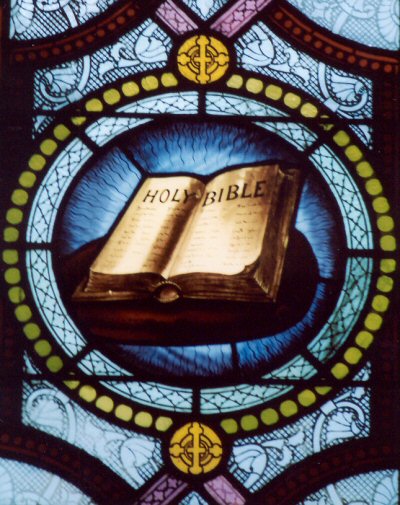 Liturgy
of the Word
Liturgy
of the Word
Christ is made known to us through the
Old Testament which prepares us to recognize Him. In those days, God
inspired men who spoke His message. Now, the New Testament Gospel reading
announces His presence to us directly through His Son. Both
readings bring God's message to us. Our responsibility is to respond.
The First Reading:
From the Old Testament.
Nehemiah 8:2-4a, 5-6, 8-10
Ezra the priest brought
the law before the assembly, which consisted of men, women, and those children
old enough to understand. Standing at one end of the open place was before the
Water Gate, he read out of the book from daybreak till midday, in the presence
of the men, the women, and those children old enough to understand; and all the
people listened attentively to the book of the law. Ezra the scribe stood on a
wooden platform that had been made for the occasion. He opened the scroll so
that all the people might see it – for he was standing higher up than any of the
people -; and, as he opened it, all the people rose. Ezra blessed the Lord, the
great God, and all the people, their hands raised high, answered, “Amen, amen!”
Then they bowed down and prostrated themselves before the Lord, their faces to
the ground. Ezra read plainly from the book of the law of God, interpreting it
so that all could understand what was read. Then Nehemiah, that is, His
Excellency, and Ezra the priest-scribe and the Levites who were instructing the
people said to all the people: “Today is holy to the Lord your God. Do not be
sad, and do not weep” – for all the people were weeping as they heard the words
of the law. He said further; “Go, eat rich foods and drink sweet drinks, and
allot portions to those who had nothing prepared; for today is holy to our
Lord. Do not be saddened this day, for rejoicing in the Lord must be your
strength!”
Priest/Reader:
The Word of the
Lord.
All:
Thanks
be to God.
The Responsorial Psalm:
This Psalm praising God, is a prayer to God,
or recommends the practice of virtue. It is sung as an interlude between
the scriptural readings. It provides yet another instructional setting and
invites the assembly to imitate the cantor who sings a repeated response to the
verses of an ancient Psalm many of which are attributed to King David. The
verses are sung first by a cantor (song leader) accompanied by instruments, the
refrain is sung by the people.
Responsorial
Psalm 84:2-3, 5-6, 9-10
Cantor: Your words, Lord, are
Spirit and life. Your words, Lord, are Spirit and life.
All: R/.
Your words, Lord, are Spirit and life. Your words, Lord, are Spirit and
life.
Cantor: The law of the Lord is perfect, refreshing the soul; the
decree of the Lord is trustworthy, giving wisdom to the simple.
All: R/. Your
words, Lord, are Spirit and life. Your words, Lord, are Spirit and life.
Cantor: The precepts of the Lord are right, rejoicing the heart;
the command of the Lord is clear, enlightening the eye.
All: R/. Your
words, Lord, are Spirit and life. Your words, Lord, are Spirit and life.
Cantor: The fear of the Lord is pure, enduring forever; the
ordinances of the Lord are true, all of them just.
All: R/. Your
words, Lord, are Spirit and life. Your words, Lord, are Spirit and life.
Cantor: Let the words of my mouth and the thought of my heart
find favor before you, O Lord, my rock and my redeemer.
All: R/.
Your words, Lord, are Spirit and life. Your words, Lord, are Spirit and
life.
Second Reading
1 Corinthians 12:12-30
Brothers and sisters: As a
body is one though it has many parts, and all the parts of the body, though
many, are one body, so also Christ. For in one Spirit we were all baptized
into one body, whether Jews or Greeks, slaves or free persons, and we were all
given to drink of one Spirit.
Now the body is not a
single part, but many. If a foot should say, "Because I am not a hand I do
not belong to the body," it does not for this reason belong any less to the
body. Or if an ear should say, "Because I am not an eye I do not belong to
the body," it does not for this reason belong any less to the body. If the
whole body were an eye, where would the hearing be? If the whole body were
hearing, where would the sense of smell be? But as it is, God placed the
parts, each one of them, in the body as he intended. If they were all one
part, where would the body be? But as it is, there are many parts, yet one
body. The eye cannot say to the hand, "I do not need you," nor again the
head to the feet, "I do not need you." Indeed, the parts of the body that
seem to be weaker are all the more necessary, and those parts of the body that
we consider less honorable we surround with greater honor, and our less
presentable parts are treated with greater propriety, where our more presentable
parts do not need this. But God has so constructed the body as to give
greater honor to a part that is without it, so that there may be no division in
the body, but that the parts may have the same concern for one another. If
one part suffers, all the parts suffer with it; if one part is honored, all the
parts share its joy.
Now you are Christ's body,
and individually parts of it. Some people God has designated in the church
to be, first, apostles; second, prophets; third, teachers; then, mighty deeds;
then gifts of healing, assistance, administration, and varieties of tongues.
Are all apostles? Are all prophets? Are all teachers? Do all
work mighty deeds? Do all have gifts of healing? Do all speak in
tongues? Do all interpret?
The Alleluia:
An ancient expression of joy anticipating
the Lord's message we will hear in the Gospel.
Cantor: Alleluia!
Alleluia! Alleluia!
All:
Alleluia! Alleluia! Alleluia!
Cantor: The Lord sent me to bring glad tidings to the
poor, and to proclaim liberty to captives.
All:
Alleluia! Alleluia! Alleluia!
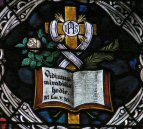 The Gospel:
The Liturgy of the Word is completed
by the reading of the Gospel. Before its reading, the members of the
assembly trace the sign of the cross upon the forehead to indicate their mental
acceptance of the Truth, on the lips to indicate their readiness to announce it,
and over the heart to indicate their sincere desire to accept it into their
lives. The "Good News" of the Gospel tells that God's kingdom has come for
all to hear, accept, and announce to the world for its salvation. It
is God who is speaking to us. Christ comes to teach us by the example of
His life and by His own words.
The Gospel:
The Liturgy of the Word is completed
by the reading of the Gospel. Before its reading, the members of the
assembly trace the sign of the cross upon the forehead to indicate their mental
acceptance of the Truth, on the lips to indicate their readiness to announce it,
and over the heart to indicate their sincere desire to accept it into their
lives. The "Good News" of the Gospel tells that God's kingdom has come for
all to hear, accept, and announce to the world for its salvation. It
is God who is speaking to us. Christ comes to teach us by the example of
His life and by His own words.
Priest: Cleanse my heart and my lips, almighty God, that I may worthily proclaim your
holy Gospel. Through the words of the Gospel may our sins be wiped away.
Priest: The Lord be with you.
All: And with our spirit.
Priest/Deacon: A
reading from the holy Gospel according
to St. Luke 1:1-4; 4:14-21.
All: Glory
to you, Lord.
Luke wrote to explain that
Christ came to save everyone.
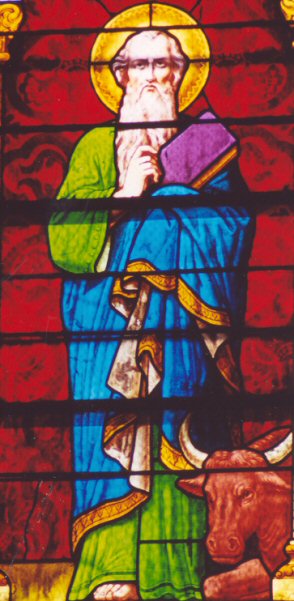
Since many have
undertaken to compile a narrative of the events that have been fulfilled among
us, just as those who were eyewitnesses from the beginning and ministers of the
word have handed them down to us, I too have decided, after investigating
everything accurately anew, to write it down in an orderly sequence for you,
most excellent Theophilus, so that you may realize the certainty of the
teachings you have received.
Jesus returned to
Galilee in the power of the Spirit, and news of him spread throughout the whole
region. He taught in their synagogues and was praised by all.
He came to Nazareth,
where he had grown up, and went according to his custom into the synagogue on
the Sabbath day. He stood up to read and was handed a scroll of the
prophet Isaiah. He unrolled the scroll and found the passage where it was
written: The spirit of the Lord is upon me, because he has anointed me to
bring glad tidings to the poor. He has sent me to proclaim liberty to
captives and recovery of sight to the blind, to let the oppressed go free, and
to proclaim a year acceptable to the Lord.
Rolling up the scroll,
he handed it back to the attendant and sat down, and the eyes of all in the
synagogue looked intently at him. He said to them, "Today this Scripture
passage is fulfilled in your hearing."
Priest: The
Gospel of the Lord.
All: Praise to you, Lord Jesus Christ.
The Priest's Sermon:
The priest develops, explains, and comments upon the Master's words,
so our minds may be
enlightened, and our
hearts enriched.
(A priestly reflection upon this Gospel)
Profession of Faith:
We state in the
Nicene Creed the principles of our faith in precise and definite terms.
All: We believe in one God, the Father, the Almighty,
maker of heaven and earth, of all that is seen and unseen. We believe in
one Lord, Jesus Christ, the only Son of God, eternally begotten of the Father,
God from God, Light from Light, true God from true God, begotten, not made, one
in Being with the Father. Through him all things were made. For us
men and for our salvation he came down from heaven: by the power of the Holy
Spirit he was born of the Virgin Mary, and became man. For our sake he was
crucified under Pontius Pilate; he suffered, died, and was buried. On the
third day he rose again in fulfillment of the Scriptures; he ascended into
heaven and is seated at the right hand of the Father. He will come again
in glory to judge the living and the dead, and his kingdom will have no end.
We believe in the Holy Spirit, the Lord, the giver of life, who proceeds from
the Father and the son. With the Father and the Son he is worshipped and
glorified. He has spoken through the Prophets. We believe in one
holy catholic and apostolic Church. We acknowledge one baptism for the
forgiveness of sins. We look for the resurrection of the dead, and the
life of the world to come. Amen.
General Intercessions:
We pray for the needs of the pope, civic
leaders, our own needs, those of others,
the sick, the dying, those who have died, the church, and the world.
The response of all to each intercession: Lord, hear our prayer.
All: Lord,
hear our prayer.
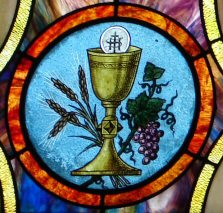 The Liturgy of the Eucharist
The Liturgy of the Eucharist
Gifts of bread and wine
symbolizing ourselves are presented to the priest who will offer them to God the
Father. Through the Holy Spirit, they will become the Body and Blood of
Jesus Christ whom we receive in Holy Communion. Jesus unites Himself with
us for our spiritual nourishment and strength. Today, when individuals do
not present their own personal offerings of bread and wine, the monetary contribution
symbolizes the material of their united sacrifice. The priest makes and
offering of the bread and wine to God.
Preparation of the Bread and
Wine:
Priest: Blessed are you, Lord God of all creation,
for through your goodness we have received the bread we offer you:
fruit of the earth and work of human hands, it will become for us the bread of
life.
All:
Blessed be God for ever.
Priest: By
the mystery of this water and wine may we come to share in the divinity of
Christ, who humbled himself to
share
in our humanity.
Priest: Blessed are you, Lord God of all creation, for through your goodness we have
received the wine we offer you; fruit
of the vine and work of human hands it will become our spiritual drink.
All: Blessed be God for ever.
Priest: With
humble spirit and contrite heart may we be accepted by you, O Lord, and may our
sacrifice in your sight this
day be pleasing to you, Lord God.
The Priest's Hands are Washed: This
act was traditionally necessary because the priest handled the various gifts
presented by the people. Now, the cleansing act using water reminds the
priest and ourselves of the need to cleanse not only the hands but the soul.
Soon, the priest's hands will hold the actual body of Christ, and we will become
His dwelling place.
Priest: Wash
me O Lord, from my iniquity and cleanse me from my sin.
Pray, brethren, that
my sacrifice and yours may be acceptable to God, the almighty Father.
All: May the Lord accept the sacrifice at your hands for the praise and glory of his
name, for our good and the good of
all his holy Church.
Prayer over the Gifts:
Speaking in our name, the priest asks
the Father to accept the gifts we offer through him.
Priest: Accept
our offerings, O Lord, we pray, and in sanctifying them grant that they may
profit us for salvation. Through Christ our Lord.
Eucharistic Prayer:
(Number Two: The priest may select from several forms).
Priest: The Lord be with you.
All: And with your
spirit.
Priest: Lift up your hearts.
All: We lift them up to the Lord.
Priest: Let us give thanks to the Lord, our God.
All: It is right
and just.
Preface Prayer:
It is truly right and just, our duty and our
salvation, always and everywhere to give you thanks, Lord, holy Father, almighty
and eternal God, through Christ our Lord. For out of compassion for the
waywardness that is ours, he humbled himself and was born of the Virgin; by the
passion of the Cross he freed us from unending death, and by rising from the
dead he gave us life eternal. And so, with Angels and Archangels, with
Thrones and Dominions, and with all the hosts and Powers of heaven, we sing the
hymn of your glory, as without end we acclaim:
Acclamation:
Priest
and All:
Holy, Holy, Holy Lord, God of hosts. Heaven and
earth are full of your glory. Hosanna in the highest.
Blessed
is he who comes
in the name of the Lord. Hosanna in the highest.
Priest: You are indeed Holy, O Lord, the fountain of all
holiness. Make holy, therefore, these gifts, we pray, by sending down your
Spirit upon them like the dewfall, so that they may become for us the Body and
Blood of our Lord Jesus Christ.
The priest repeats the words which
Christ used at his Last Supper when He changed the bread into His Body and the
wine into His Blood. His Body and Blood are truly present but under the
appearance of bread and wine. The death of Christ is prolonged in each of
those who receive Him worthily. We apply His death to ourselves so that we
may share His glory. This moment is the most solemn on earth because it is
Divine act which enables us to apply to ourselves the Cross which Christ
willingly took upon Himself.
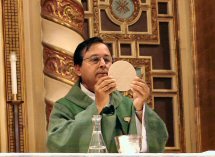 We are called to die to sin and
lift our very selves to God so that we become changed; to do as God would have
us do, to become what God would have us become. Our own little cross can
lift us into union with Christ's Cross so we may earn the joys of everlasting
happiness with God the Father.
We are called to die to sin and
lift our very selves to God so that we become changed; to do as God would have
us do, to become what God would have us become. Our own little cross can
lift us into union with Christ's Cross so we may earn the joys of everlasting
happiness with God the Father.
The
Lord's Supper:
At the time he was betrayed and entered
willingly into his Passion, he took bread and, giving thanks, broke it, and gave
it to his disciples, saying:
Take this, all of you, and eat of it, for this is my Body, which will be given
up for you.
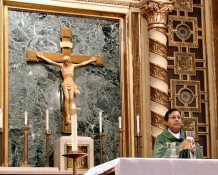 In
a similar way, when supper was ended, he took the chalice and, once more giving
thanks, he gave it to his disciples, saying:
In
a similar way, when supper was ended, he took the chalice and, once more giving
thanks, he gave it to his disciples, saying:
Take this, all of you, and
drink from it, for this is the chalice of my Blood, the Blood of the new and
eternal covenant, which will be poured out for you and for many for the
forgiveness of sins. Do this in memory of me.
Memorial Acclamation: (The priest may
select from several forms).
Priest: The
mystery of faith.
Priest
/ All: We
proclaim your Death, O Lord, and profess your Resurrection until you come again.
Memorial Prayer: (The
priest may select from several forms).
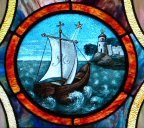 Priest:
Priest:
Recalls Christ's Passion, Resurrection, Ascension, the Church,
the dead, and ourselves.
Therefore, O Lord, as we celebrate the memorial of his Death and
Resurrection, we offer you, Lord, the Bread of life and the Chalice of
salvation, giving thanks that you have held us worthy to be in your presence and
minister to you. Humbly we pray that, partaking of the Body and Blood of
Christ, we may be gathered into one by the Holy Spirit.
Remember, your Church, spread throughout the
world, and bring her to the fullness of charity, together with _____ our Pope,
and _____ our Bishop, and all the clergy. Remember also our brothers and
sisters who have fallen asleep in the hope of the resurrection, and all who have
died in your mercy: welcome them into the light of your face. Have mercy
on us all, we pray, that with the Blessed Virgin Mary, Mother of God, with the
blessed Apostles, and all the Saints who have pleased you throughout the ages,
we may merit to be coheirs to eternal life, and may praise and glorify you
through your Son, Jesus Christ.
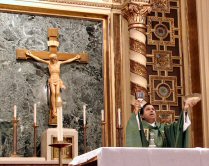 Doxology
Doxology
Prayer of Praise:
Through
him, with him, and in him, O God, almighty Father, in the unity of the Holy
Spirit, all glory and honor is yours, for ever and ever.
All: Amen.
Communion Rite
In the Liturgy of the Eucharist, we
symbolically offer ourselves to the Lord through the gifts of bread and wine.
At the Consecration, we offer our very lives to be united the God the Father
through the Cross of Christ. In Communion, we find that we have not died
at all, but have come to life. We have surrendered ourselves to God
through His Divine Son, Jesus Christ. In return become ennobled and
enriched. We give up time and we get eternity, we give up our sin and we
receive grace, we surrender our self-will and receive the strength of the Divine
Will, we give up ourselves and we receive everything. For the Son of God
says to us that unless we receive Him we shall not have Divine life in us.
But it is not really we who receive Christ as it is Christ who receives us,
bringing us into Himself.
God makes His Cross the very means
of our salvation and our life. While we have crucified Him, His eternal
love cannot be extinguished. Christ willed to give us the very life we
crucified in our Redemption, the Consecration of Holy Thursday into Communion,
His death into our everlasting life.
The Lord's
Prayer:
Priest: At
the Savior's command and formed by divine teaching, we dare to say:
Priest and
All: Our
Father, who art in heaven, hallowed be they name; Thy kingdom come; Thy will be
done on earth as it is in
heaven. Give us this
day our daily bread, and forgive us our trespasses, as we forgive those who
trespass against us; and lead us not into temptation, but deliver us from evil.
Priest: Deliver us, Lord, we pray, from every evil, graciously
grant peace in our days, that, by the help of your mercy, we may be always free
from sin and safe from all distress, as we await the blessed hope and the coming
of our Savior, Jesus Christ.
All: For the
kingdom, the power and the glory are yours now and forever.
Prayer for
Peace:
Priest: Lord Jesus Christ, who said to your Apostles: Peace I leave
you, my peace I give you, look not on our sins, but on the faith of your Church,
and graciously grant her peace and unity in accordance with your will. Who
live and reign for ever and ever.
All: Amen.
Priest: The peace of the Lord be with
you always.
All: And with your spirit.
Priest: Let us offer each other the sign of peace.
Breaking of the Bread:
Priest: May this mingling of the Body and Blood of our Lord
Jesus Christ bring eternal life to us who receive it.
Priest and All: Lamb of God, you take away the sins of the world,
have mercy on us.
Lamb of God, you take away the sins of the world, have mercy on us.
Lamb of God, you take away the sins of the world, grant us peace.
Priestly Preparation: Lord Jesus Christ, Son of the
living God, who, by the will of the Father and the work of the Holy Spirit,
through your Death gave life to the world, free me by this, your most holy Body
and Blood, from all my sins and from every evil; keep me always faithful to your
commandments, and never let me be parted from you.
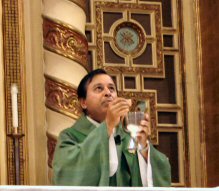 Priest: Behold
the Lamb of God, behold him who takes away the sins of the world. Blessed
are those called to the supper of the Lamb.
Priest: Behold
the Lamb of God, behold him who takes away the sins of the world. Blessed
are those called to the supper of the Lamb.
Priest and All: Lord,
I am not worthy that you should enter under my roof, but only say the world and
my soul shall be healed.
Priest: May the Body of Christ keep me safe for eternal life.
May
the Blood of Christ keep me safe for eternal life.
Communion Antiphon:
Psalm 34:6
Look toward the Lord and be radiant; let your faces not be abashed.
Communion of the Faithful:
Priest:
The Body of Christ.
The Faithful: Amen.
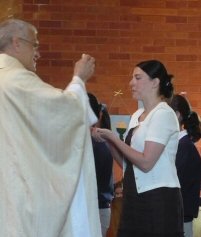
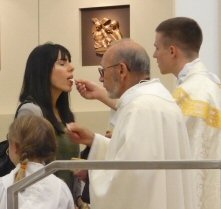
Priest/Deacon/
Extraordinary Eucharistic Minister:
The Blood of Christ.
The Faithful: Amen.
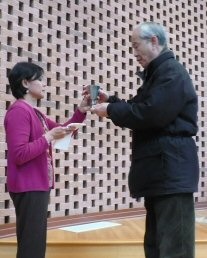
Cleansing of the Vessels:
Priest: What has passed our lips as food, O Lord, may we
possess in purity of heart, that what has been given to us in time may be our
healing for eternity.
Prayer after Communion:
Priest: Let us pray.
Priest: Grant,
we pray, almighty God, that, receiving the grace by which you bring us to new
life, we may always glory in your gift. Through Christ our Lord.
Concluding Rite
Priest: The Lord be with you.
All: And
with your spirit.
Priest: Bow
down for the blessing.
Dismissal Prayer: (The priest may select
from several forms)
Priest: May God bless you in his kindness and pour out saving
wisdom upon you.
All: Amen.
Priest: May he nourish you always with the teachings of the faith
and make you persevere in holy deeds.
All: Amen.
Priest: May he turn your steps towards himself and show you the
path of charity and peace.
All: Amen.
Priest: And may the blessing of almighty God, the Father, and the Son, and
the Holy Spirit, come down on you and remain with you for ever.
All: Amen.
Priest: Go forth, the Mass is ended.
All: Thanks be to God.
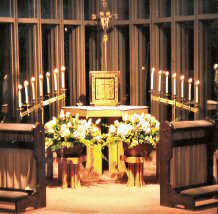 O my Jesus, forgive us our sins.
O my Jesus, forgive us our sins.
Save us from the fires of hell.
Lead all souls to heaven,
especially those in most need of your mercy.
www.Divinemasterplanforlife.com
www.Saintsnheaven.com
Top
Home Page
Liturgical
Year Cycle 12-13
 Liturgy
of the Word
Liturgy
of the Word The Gospel:
The Liturgy of the Word is completed
by the reading of the Gospel. Before its reading, the members of the
assembly trace the sign of the cross upon the forehead to indicate their mental
acceptance of the Truth, on the lips to indicate their readiness to announce it,
and over the heart to indicate their sincere desire to accept it into their
lives. The "Good News" of the Gospel tells that God's kingdom has come for
all to hear, accept, and announce to the world for its salvation. It
is God who is speaking to us. Christ comes to teach us by the example of
His life and by His own words.
The Gospel:
The Liturgy of the Word is completed
by the reading of the Gospel. Before its reading, the members of the
assembly trace the sign of the cross upon the forehead to indicate their mental
acceptance of the Truth, on the lips to indicate their readiness to announce it,
and over the heart to indicate their sincere desire to accept it into their
lives. The "Good News" of the Gospel tells that God's kingdom has come for
all to hear, accept, and announce to the world for its salvation. It
is God who is speaking to us. Christ comes to teach us by the example of
His life and by His own words.
 The Liturgy of the Eucharist
The Liturgy of the Eucharist We are called to die to sin and
lift our very selves to God so that we become changed; to do as God would have
us do, to become what God would have us become. Our own little cross can
lift us into union with Christ's Cross so we may earn the joys of everlasting
happiness with God the Father.
We are called to die to sin and
lift our very selves to God so that we become changed; to do as God would have
us do, to become what God would have us become. Our own little cross can
lift us into union with Christ's Cross so we may earn the joys of everlasting
happiness with God the Father.
 In
a similar way, when supper was ended, he took the chalice and, once more giving
thanks, he gave it to his disciples, saying:
In
a similar way, when supper was ended, he took the chalice and, once more giving
thanks, he gave it to his disciples, saying: Priest:
Priest:  Doxology
Doxology Priest: Behold
the Lamb of God, behold him who takes away the sins of the world. Blessed
are those called to the supper of the Lamb.
Priest: Behold
the Lamb of God, behold him who takes away the sins of the world. Blessed
are those called to the supper of the Lamb. 


 O my Jesus, forgive us our sins.
O my Jesus, forgive us our sins.